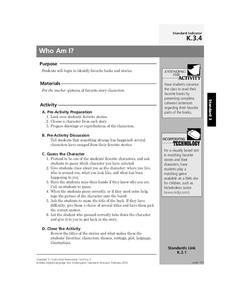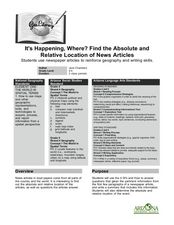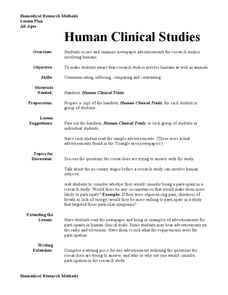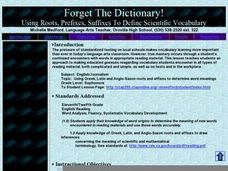Curated OER
Rhetorical Devices
Twelfth graders identify and analyze examples of rhetorical devices as valid or invalid inferences. In this text analysis lesson, 12th graders research a controversial topic in teams and identify rhetorical devices for the topic....
Curated OER
Who Am I?
Students read a story together then choose a favorite character to portray. In this inference lesson, students pretend to be one of the characters in the story, they prepare drawings or actions then present them to the class. Students...
Curated OER
The Legend of the Blue Bonnet
Students complete pre reading, writing, during reading, and interdisciplinary activities for the book The Legend of the Blue Bonnet. In this reading lesson plan, students complete journal entries, go over vocabulary, answer short answer...
Curated OER
the Declaration of Independence Lesson
Students demonstrate reading comprehension skills, including reading strategies, inference, literal meaning, and critical analysis.
Curated OER
COMING TO AMERICA:A PILGRIM STORY LESSON
By completing this lesson, students demonstrate their reading comprehension skills, including reading strategies, inference, literal meaning, and critical analysis.
Curated OER
Civil War: The North History Lesson
Students demonstrate their reading comprehension skills, including reading strategies, inference, literal meaning, and critical analysis.
Curated OER
The Study of the Spanish-Speaking People of Texas: Understanding Photo Essays
Students analyze a photo essay of the Spanish-Speaking People of Texas by the photojournalist Russell Lee. They identify the goals of the photo essay, explore a website, and complete a worksheet.
Albert Shanker Institute
Economic Causes of the March on Washington
Money can't buy happiness, but it can put food on the table and pay the bills. The first of a five-lesson unit teaches pupils about the unemployment rate in 1963 and its relationship with the March on Washington. They learn how to create...
Curated OER
Reading Strategies for Elementary Students
Students practice using strategies to help them read. They participate in activities that help them sound out words and determining the main idea. They also examine good and bad reading habits.
Curated OER
Tooling Around Arizona: Reading Arizona Maps
Students study geography. In this Arizona maps activity, students develop their map reading skills. They have class discussions and work independently with various copies of Arizona maps to practice those skills. This activity mentions...
Curated OER
Temperature Zones
Students read and make inferences about a map showing various temperature zones across the United States.
Curated OER
It's Happening, Where? Find the Absolute and Relative Location of News Articles
Young scholars read newspaper articles. In this social studies lesson plan, students locate the latitude and longitude of the location where the news article takes place. Young scholars write a summary of the news article.
Curated OER
Mapping Roxaboxen
Fourth graders read Roxaboxen and draw a map of the Roxaboxen community. In this language arts and geography lesson, 4th graders use specifications given, adding features to the map as described in the book and creating a legend.
Curated OER
Sequence, Predict, Infer: Pink and Say
Practice sequencing with your 2nd graders via Patricia Polacco's Civil War book Pink and Say. Begin with a blindfold and a bag of mystery items. Connect their use of clues to identify what they can't see with the skill of making...
Curated OER
The Case of the "Lost Gorge:
Learners examine the case of a map making expedition. In groups, they read a case study on "The Lost Gorge" in the Finger Lakes region of New York state. They examine maps and determine where the error in the map-making occured to end...
Curated OER
Indians of the Pacific Northwest
Students organize acquired information and make inferences as to the kind of habitat and its probable location. They identify and replicate art forms characteristic of the Pacific Northwest coast involving the use of ovoids and "u forms".
Curated OER
Language Arts: Plot Summary
Eighth graders implement plot summary organizers to identify essential elements such as conflict and resolution in literature. In pairs, they retell fairy tales to each other and complete plot summaries about them. As students read new...
Curated OER
Introducing Literary Elements in Fiction
Identify literary elements in fiction. In this reading comprehension lesson, learners read the book Pigsty and record literary elements onto a graphic organizer. They specifically discuss the main characters and events in the text.
Curated OER
Using Print Media in the LCTL Classroom
Explore newspapers as a form of print media. They examine headlines from newspapers and infer meanings of the headlines. They skim articles for information and exchange articles between groups. They complete charts while skimming the...
Curated OER
Human Clinical Studies
A simple, yet poignant lesson gets teens reading ads for clinical trials and discussing the requirements for participation. At home, they peruse the newspaper to find current examples of similar advertisements. The purpose of this lesson...
Curated OER
Creating Context Mural
students examine the historical, political, religious and culture aspects of the Renaissance. Using this information, they read "Galileo" by Bertolt Brecht. They use the internet to research a specific event of the time period and come...
Curated OER
Forget The Dictionary!
Accessing Web sites and playing interactive word games enliven the study of Greek, Latin and Anglo-Saxon roots and affixes. Alas, the link to resources appears broken. Take some time to find game links.
Curated OER
Focus on Figurative Language
Using the poems "First Snow" by Ted Kooser and "Eating Alone" by Yi-Young Lee (or other suggested poems by Robert Frost or Sara Teasdale), middle schoolers search for examples of figurative language. Guide your learners by discussing...
Curated OER
Chocolate Fever
Students study plants in the rainforest. They complete a variety of activities surrounding the subject of chocolate. They create new candy bars, invent learning games and write poetry--all focusing on chocolate.

























